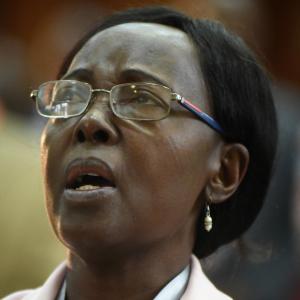
Anne Linno is a Member of the South Sudanese National Legislative Assembly.
Hon. Anne Lino Wuor Abyie is a Member of the South Sudanese National Legislative Assembly.She is one of the South Sudanese MPs who attended the last two consecutive African Biblical Leadership (ABLI) Forums. Her passion is bringing the Bible to the ream of governance. As an MP she leads Bible Study programme at the houses of parliament every Monday. We sat together with her to discuss the Bible, public life and the political climate in South Sudan.
Describe your first encounter with the Bible?
I grew up in a Catholic family, knowing the catechism (a summary of official Catholic teachings including creeds, sacraments, commandments and prayers). Obviously the Bible is the origin of these teachings. When I accepted Jesus Christ as my personal Saviour thirty-seven years ago, I drew closer to Jesus through prayers and fasting. Bible reading also became a part of my daily activities. In other words, the Bible became my life, my friend and my guide. Fifteen years ago, I vowed not to eat food before reading the Bible daily. Now starting my day with reading the Bible has become my habit, and I thank the Holy Spirit for helping me in this.
Now starting my day with reading the Bible has become my habit.
How did the Bible shape your political outlook and career?
There are great biblical stories about political figures such as kings and rulers. These stories tell us that when politicians obey God and depend on him, they prosper in everything they do. Their nations also live in peace as the result of God’s protection. Therefore, their children prosper because of peace and tranquillity in the nation. It is this biblical teaching about obedience to God and dependence on him that is central to my involvement in politics. I approach my role with openness for God to use me for his glory. I also use the biblical story to motivate my colleagues.
We know that you have been leading a weekly Bible study in the parliament. What motivated you to do so? Tell us what challenges you face in the process.
Yes, I lead a weekly Bible study in the parliament for Christian MPs which includes a prayer session and other Christian activities. We also want to hold a National Prayer Breakfast in South Sudan. I would say the source of my motivation is God himself. I made a vow before being elected. I promised to myself that, if I get elected, I will set up a Christian Fellowship for MPs and a Bible Study in the parliament. The aim was to help my colleagues to discover biblical wisdom, and ultimately, lead them to Christ.
It did not take long to find out I had unrealistic expectations of realising my dream. There were challenges along the way. First, I thought that most of the MPs will be enthusiastic about being a part of such fellowship. This, actually, was not the case. Thankfully, however, enough MPs are enthusiastic about reading the Bible together and praying. So we have been able to carry on with this for the past few years. Secondly, we plan to hold a National Prayer Breakfast. As a nation struggling with many problems, raising funds for this event has become a big challenge. Thirdly, we would like to expand the parliamentary Bible study practice to all twenty-eight states in South Sudan. Realising this at the level of State Assemblies is another challenge.
What do you think about the value of the Bible in breaking ethnic and political barriers?
The Bible certainly is well-positioned to help bridge ethnic and political divides. For example, love and unity are important aspects of biblical teaching. Paul in Galatians 3.26–29 teaches us that we are unified and made equal in Christ regardless of our ethnic background. Jews and Gentiles, slaves and free people and men and women have been made one. Inasmuch as South Sudan is a predominantly Christian country, such biblical teaching is essential in reminding us of equality and value of every individual. Moreover, the Bible gives us the basis for the ministry of reconciliation, and he made us agents of peace (2 Cor 5.18–21)
It is this biblical teaching about obedience to God and dependence on him that is central to my involvement in politics.
What do you think is the role of the Church in bringing peace and reconciliation in South Sudan?
The Church can play different roles in bringing peace and reconciliation in South Sudan. Before doing this, however, the Church should do its homework. In other words, the Church should be united, speak the truth, and be the voice for the voiceless. Secondly, as mandated in the Bible, the Church should preach peace, and reflect the image of the Prince of Peace in its daily life. This will then be a source for reconciliation. Thirdly, the Church needs to strengthen the military chaplaincy effort. The Military would greatly benefit from understanding biblical values and the value of human life. Fourth, the Church should have courage to caution the President, Governors and other leaders when they go astray. Fifth, the Church should identify and help to remove the cultural strongholds that cause war and disunity.
We would like to expand the parliamentary Bible study practice to all twenty-eight states in South Sudan.
Hope is one of the fundamental messages of biblical teaching. What does it mean to hope in South Sudan?
In South Sudan, the political situation is very volatile. Even then, our hope is anchored in the word of God, in his forgiveness, grace, mercy and compassion. So, hope for us is waiting for the restoration with trust and confession. There is hope for South Sudan!
Published: 31/10/2016
Although IBAC exists to foster conversations on Bible advocacy-related issues, the views or opinions represented in this blog are solely those of the author